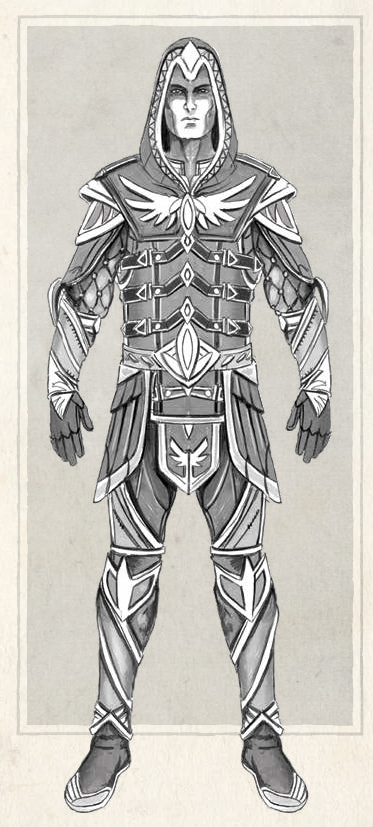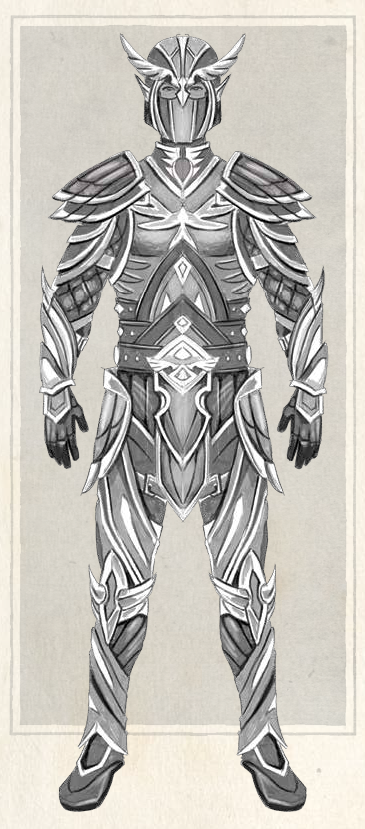Gathering Force/Chapter 1
Real author : David S. J. Hodgson (Writter), Caio Cacau (Artist) Original media : The Hero's Guides to The Elder Scrolls Online
By Longinus Attius, 2E 581
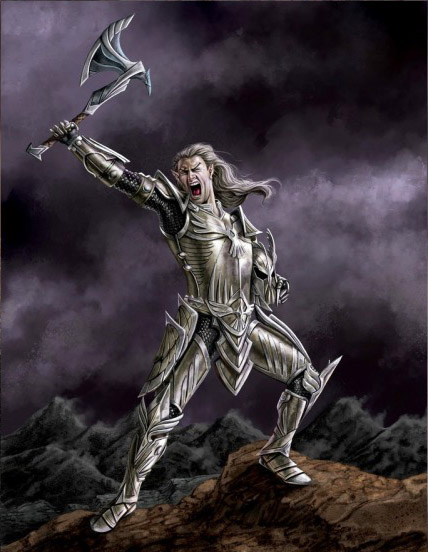
I T TOOK SOME gentle, purring persuasion on the part of the Khajiiti champion, Zadabal-ra, to convince the aloof, golden-skinned inhabitant of Summerset Isles to arrive at our fighters' feast. But arrive he did, bringing a caravan of gleaming shields, winged helms, and spears dedicated to Phynaster the Guardian. Though we uncultured barbarians of the mainland had to sit through copious waffle regarding our shortfalls in battle, which almost brought the Nord champion to a seething, violent outburst, tempers were soothed with mead and some ferocious combat training, where the soaring and fluid designs of the Altmeri weapons of war - thin and swan necked like their ships - were finally tested.
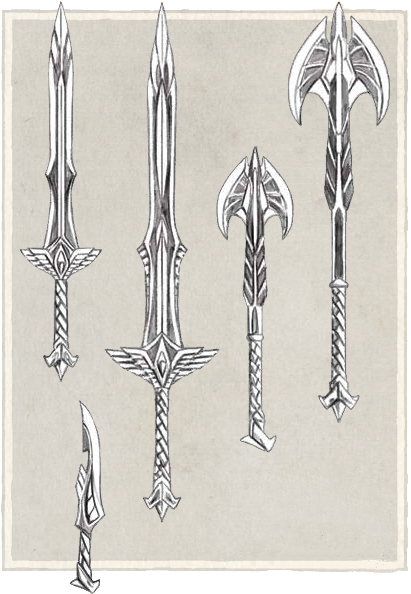 Altmeri armor and weaponry has a sturdy elegance that many others have attempted and failed to achieve. Even the lowliest Altmer has a disdain for iron, steel, or other materials of the common mainlander, so more exotic ores and minerals are part of the forging process, which can be as convoluted as their patterns of speech. While fanciful materials ate common, glass is perhaps the most impressive when swords or axes are formed from this collection of resins and volcanic deposits. The results are surprisingly robust, but always alluring in form. Such weaponry is well weighted, a milky green in color, but the blades require constant and careful sharpening. The bounty of rare (and mostly crystalline) minerals that Summerset Isles hides beneath its rich soils is used to enhance a variety of beautifully crafted arms. One may swing a lengthy blade embedded with glass details, golden pommel, and stylized eagle wings and heads. One might draw the winged bow of a High Elf, while comparing its supple curvature to a maiden's thigh. The Altmer does not hunt wild animals for his grip or trim work, preferring the slaughter of specially bred guar to provide the most pliable of leather for an axe's grip. The result is an astonishing balance of ornate delicateness and sinister sharpness. 
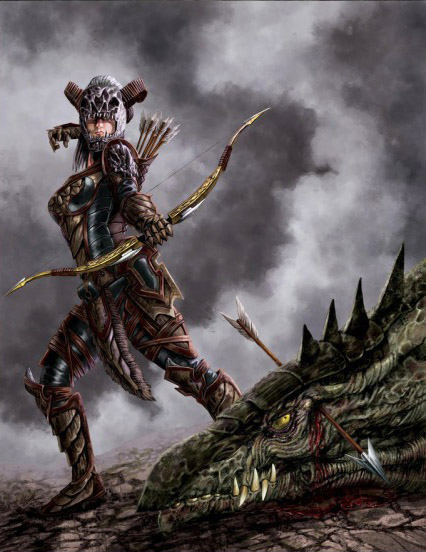
T HE BOSMER HAVE A rather amusing wonderment for nature, and were this simply a predisposition to frolicking in the forests, I would have no cause for concern. But the Wood Elf's veneration for the dappled sapling and the delicate moss extends to an almost crippling disregard for cultivation
and management of their bounteous resources. For despite king surrounded by the finest graht oaks in the land, no Bosmer is permitted to craft arms or armor from plants. However, just as they enjoy the fermented pig's milk of Jagga and the smoky intoxication of dried caterpillar, there are ways to solve the riddle of the Green Pact. Without wooden arrows or shields, a Bosmer will descend upon animals like a rabid skeever on a shipmate's toe. Beware the curse of being a forest creature in Valenwood, as your life is likely to be brief, and your corpse parts skinned, flayed, fiddled with, and generally put to use; there are never remains for the maggots. Expect to see a Wood Elf clad in leather, shell plates, and occasionally antlers, with skulls for helms and other bones for fancy ornamentation. For more robust protection, strange insect resins and equally odd alchemical additives are combined to color and stiffen the plackart and fauld. As forge fires are banished from the realm of the Bosmer, hand weapons made from metal are rarely used within Valenwood. When a bow is out of reach, expect an axe, spear, or blade shaped from jagged glass or flint stone, grasped with a primitive hand holding a primitive bone handle. No, it is the bow for which the Bosmer craftsman is rightly revered: Cunning concoctions of honey vinegar, brought to the boil before other secretive elements are added, improve the flexibility of the bone stick, and the time submerged greatly affects the form of the stick. Until the recent truce, most bowstrings were fashioned from Khajiiti gut. The arming of a Wood Elf involves the polishing of flint, the melding of metal, the chiseling of bone, and the fusing of glass into elegant shapes. Or the purchasing of a wooden weapon crafted by another race.
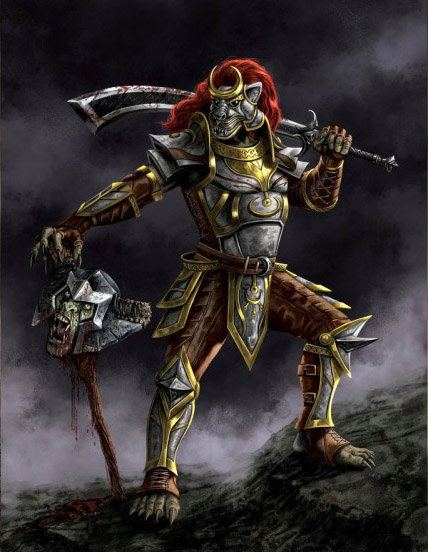
M UCH IN THE WAY a Redguard favors a billowing flow of cloth, a Khajiit prefers armor that is both lightweight and hard wearing, due to the swelter of both the Khajiiti homeland and the naturally thick coats they refuse to shave. But the incessantly arid landscapes of Elsweyr tell only part of the story, for the cat folk hiss and spit at coverings that might encumber them, and claw away at armor seen as a restraint to their natural agility. Perhaps the only moment one will spy a Khajiit clad inthe heaviest of protection is just prior to a regimented war, which the cat does not favor.
Devotion to the moons is at the forefront of any embossment or augmentation of Khajiiti attire, and shields and plate armor are no exception. Certain shields are crescent shaped, to aid in both the veneration of Maser and Secunda, and in the swift stabbing motion through the shield's gap favored by the dagger-wielding warrior. Expect what armor that is worn to be made of lacquer& segments, sometimes encrusted with horn and seal onto loose-fitting leather. Some Khajiit shun metal completely, nuzzling instead against quilted and brightly patterned cloth. Striped tunics with fancy embroidery show indigenous skill, which extends to the fluted silver edging of more ceremonial armor pieces. Even the most cumbersome and weighty protection of a Khajiit is particularly unsubstantial in nature when compared to that of a Nord or, especially, an Orc. This is gossamer attire, with only vulnerable elements such as greaves and gauntlets receiving special attention. Instead, expect loose shawls, ribbons, and other trinkets to form decoration. But do not mistake their weapons for anything more than a collection of extremely sharp and ferocious slashing implements. While longbows and javelins are brought for hunts, the cat folk relish in supplementing their own claws with a wide variety of fiendish blades, ranging from the smallest punch dagger and smaller knives, to the curved scimitar blade. When caressing a Khajiiti weapon of war, one must be careful not to catch oneself on a pointed edge. It is rare to chance upon a Khajiiti weapon that doesn't feature a curved edge or a symbol of the waxing or waning moon.
|

